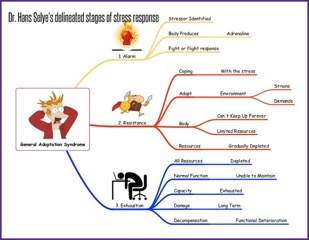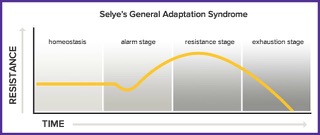Our Stressful Lives: Part 1
What can we do about it?
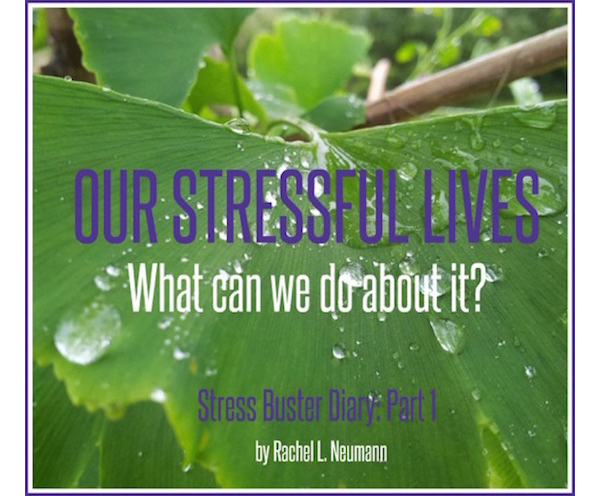
Share:
Life sometimes deals us one shock after another. Unexpectedly, love affairs become stalking nightmares. Marriages end. Children become ill. A loved one dies. And our nervous systems just naturally respond with the stress response.
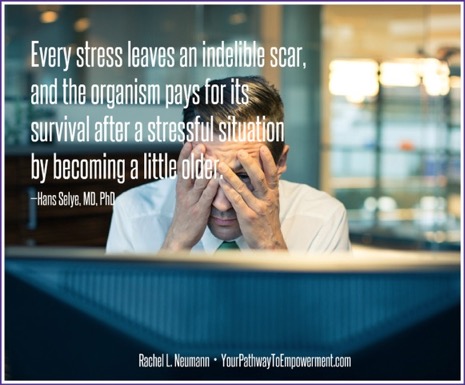
Shocking events such as these are up close and personal, but what about the perceived dangers of war, violent weather and economic collapse? What happens to the body, to the nervous system, when life hands you a bushel of lemons and shock stops you dead in your tracks?
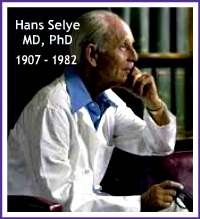
Dr. Selye was the first to give a scientific explanation for biological stress. He actually borrowed the term “stress” from physics in order to describe an organism’s physiological response to perceived stressful events in the environment.
Dr. Selye’s General Adaptation Syndrome (GAS) explains what happens in response to both our real stress and perceived stress at the physical and neurological level. Any stressful event causes the body’s systems to respond at both the physiological and psychobiological level.
What happens when a stressful event grabs you from behind when you’re not expecting it and you’re not prepared? And . . . can you ever be prepared?
Dr. Selye’s three delineated stages of stress response (GAS) are:
ALARM
Upon perceiving a stressor, the body reacts with a “fight or flight” response and the sympathetic nervous system is stimulated as the body’s resources are mobilized to meet the threat or danger.
RESISTANCE
The body resists and compensates. The parasympathetic nervous system attempts to return many physiological functions to normal levels while the body focuses resources against the stressor and remains on alert.
EXHAUSTION
If the stressor or stressors continue beyond the body’s capacity, its resources become exhausted and the body is susceptible to disease and death.
Today, let's look at how you would experience the ALARM stage in your body.
First, you might feel stunned or shocked! Your brain, specifically the amygdala, will get busy immediately telling your heart to pump more blood to the large muscles of the body. The alarms will be sounding to those muscles to get ready to run! Get ready to fight! Danger! Danger! Danger!
All sorts of physiological changes will occur as the muscles contract and fill with more blood and feel very tense. While more energy is going to the muscles, LESS blood is sent to the prefrontal cortex. The higher thought processes are ‘dumbed down.’ There is no time for deep thought. It’s time to RUN! Survival, not creativity, is the priority.
Healing the body is another low priority in the midst of a stress response. The immune system is also ‘dumbed down’ while resources are being sent to the greater priority of survival.
Digestion, sleep, and sex also suffer when stress demands the arousal of the sympathetic nervous system for survival. After all, sleep is not compatible with the ‘run from your enemy' and ‘fight for your life’ orders from the amygdala.
Even though the demand for water and nourishment will increase, the stomach will not be able to digest as well. The digestive system will also start to shut down and adapt to the stress response. Reflux, heartburn and indigestion are common.
Lying awake at night counting sheep until dawn is also common. Sleep is incompatible with the stress response.
And, forget about sex. Will you really stop for sex while you are running from a wild tiger, a murderer, or a hurricane? The body knows that survival is a priority.
But what if stress is prolonged? Our lives are full of stress every day — 24/7! And what about the stress stored deep in our muscles and in our cellular memory?
All stress, imagined or real, is poisoning each of us with stress hormones. In fact, almost everything associated with living, as Dr. Selye points out, is constantly adding to our burden of stress.
What can we do about stress? My recommendation is you start by taking a good look at your body's bio-chemical chaos with a Hair Tissue Mineral Analysis (Hair TMA) coordinated with me and Rick Malter, PhD, author of The Strands of Health: A Guide to Understanding Hair Mineral Analysis.
Email me today at Rachel@YourPathwayToEmpowerment.com or click the scheduling link below to investigate the root of the pesky bio-chemical chaos issues that are dulling your energy. Schedule your quick empowered health Hair TMA phone overview with me today at the link and we'll get your Hair TMA in motion: https://www.timetrade.com/book/K7SM2
Next time I'll share insights on:
1) what stress does to us
2) how excess adrenaline is our constant enemy, and
3) why we are smarter, healthier, and more creative in an environment of peace and tranquility.
Check out the Hair Tissue Mineral Analysis article on my blog entitled Time to Check Your Spark Plugs: A natural approach to getting yourself energized, empowered, motivated.
Blessings,

Copyright 2015 © by Rachel L. Neumann of Your Pathway to Empowerment. All rights reserved. You may quote, copy, translate and link to this article in its entirety as long as you credit Rachel L. Neumann, the author by name, and include a working link back to this web page. All other uses are strictly prohibited.
Ready for powerful change? Transformation?
Rachel offers one of the most life-changing, transformative and empowering opportunities available in the coaching field today. All areas of your life will be positively affected. More confidence, an improved sense of well-being, a quieter mind, a healthier body, and better balance in the areas of your life that matter most. Gentle energy techniques create change quickly and efficiently, and provide the expanded consciousness and insightful self-knowledge to empower you to exuberant action and creativity.
Click the link below to download the questionnaire for Rachel’s Complimentary Discovery Session. Upon receipt of your completed questionnaire, we’ll contact you to schedule your complimentary 60-minute discovery session.
Comp Session Questionnaire
